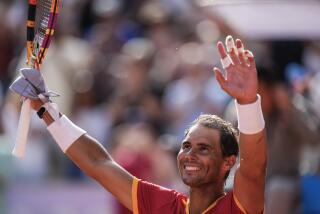Ashe Explains Problems of Davis Cup Captains : Tells Why He Objected to Requirement That Players Sign a Code of Conduct
- Share via
Arthur Ashe has been at it too long to get angry anymore about tennis politics. And the outspoken Ashe doesn’t mind making other people fume. In fact, he rather likes it.
He hasn’t toned it down in the least throughout the years. He began as a target of controversy himself, a black a man who helped break the color barrier in tennis.
While Ashe was winning Wimbledon and the U.S. Open with grace through the ‘60s and ‘70s, thanking all the right people, he was also speaking out for athletes’ rights and suggesting ways to improve the structure of tennis.
While Ashe was the model of decorum on the court, he was also working zealously behind the scenes to open the game to minorities and the disadvantaged. He talked about putting something back into the sport in an era when players were just testing the limits of how much tennis could give them.
So, when Ashe resigned last week after five years as captain of the U.S. Davis Cup, it was another blip in the line of his success. Ashe turned in his resignation less than a day after reports had circulated that he had been asked to step down.
“They (Davis Cup Committee) wanted to make a change, I said fine,” Ashe said. He was in Los Angeles Friday to receive the first J.D. Morgan Award for his contribution to college tennis. Ashe played for Morgan at UCLA. The award was given in conjunction with the Volvo Tennis/All-American tournament at the Los Angeles Tennis Center at UCLA.
Ashe’s resignation may be seen as a lateral move. He was named Davis Cup vice chairman, with a possibility of being named chairman at some point. Ashe said he expects a new captain to be named within a week.
Ashe captained the team five years, winning the cup twice. His tenure was one of the longest. “We really haven’t had captains who stay on, shall we say-- ad nauseam , some people would say-- ad infinitum ,” he said.
It is believed that the Davis Cup Committee, as well as some officials in the U.S. Tennis Assn., were hoping to bring in new blood, perhaps blood not so warm as Ashe’s. Ashe had often been critical of the U.S. Davis Cup system, which brings selected professional players together twice a year in international competition.
Recently, Ashe ran afoul of the committee after its controversial decision requiring players to sign a code of conduct in an attempt to eradicate unsportsmanlike behavior. Outbursts by John McEnroe, among others, marred recent Davis Cup matches.
Ashe clashed with officials over the requirement, and McEnroe, Jimmy Connors and Vitas Gerulaitis refused to sign. They were asked to join this year’s team.
“I think it was well known that I didn’t want to see the code put in writing,” Ashe said. “I was all for the code. I think if any American wants to play for his country, he will behave in a fitting manner.
“I just didn’t think grown men and women should have to put their names to that. The penalty for misbehaving is the same if you sign or don’t.”
It wasn’t the first difficult moment for Ashe during his tenure. He was criticized because the U.S. team didn’t win, although as he points out, the job of the captain is to choose the team and decide who plays singles.
The three losses, to Argentina, Sweden and West Germany, occurred on clay, the surface on which American players are at their weakest.
“A Davis Cup captain does not have the same authority of (Laker coach) Pat Riley,” Ashe said. “You can’t pull McEnroe down if he misbehaves. You can’t fine them. You can’t not put somebody on the team just because he’s not liked. You simply have to make do with what you’ve got. They only play one or two times a year.”
Not only did Ashe have problems “coaching” Davis Cup teams, he increasingly had difficulty recruiting players for them. Connors was not faithful to Davis Cup. McEnroe was, but he complained about everything in sight. It became trendy for players to hang up when Davis Cup called.
“I don’t think we’ll have any more American players who don’t want to play for Davis Cup,” Ashe said. “I think those days are gone. I think we can change that sort of thinking in the minds of some players.”
Ashe had quadruple bypass heart surgery six years ago but he remains vigorous, although not as active physically as he once was. That doesn’t mean, though, that he’s not still an activist. Early this year he was one of a group of 52 who were arrested during an anti-apartheid demonstration in front of the South African Embassy in Washington.
Friday, he was full of ideas for making college tennis stronger, and full of ways to bring the game to Third World nations.
“Something like the Olympics really helped tennis in the Third World,” Ashe said. “The sports officials can see the positive benefits that accrue to the country that wins a gold medal.”
Ashe will continue to spread the word as long as there is a forum and people are willing to sit for a while and listen. He isn’t likely to change, no matter how much the tennis Establishment tries to change him.
Seeded players continued to fall in the Volvo/All-American tournament. Top-seeded Jim Grabb of Stanford was beaten in Friday’s quarterfinals by Bobby Blair of Arkansas, 7-6 (8-6), 2-6, 6-3. Bruce Man Song Hing of UC Irvine defeated No. 3 seeded Richey Reneberg of Southern Methodist, 1-6, 6-2, 6-3.
The tournament will resume with the semifinals today at noon.
More to Read
Go beyond the scoreboard
Get the latest on L.A.'s teams in the daily Sports Report newsletter.
You may occasionally receive promotional content from the Los Angeles Times.











